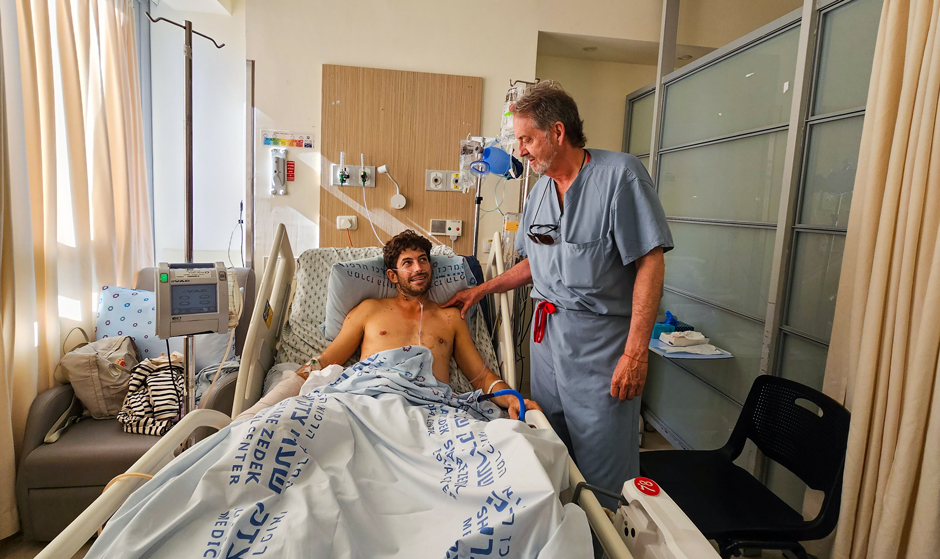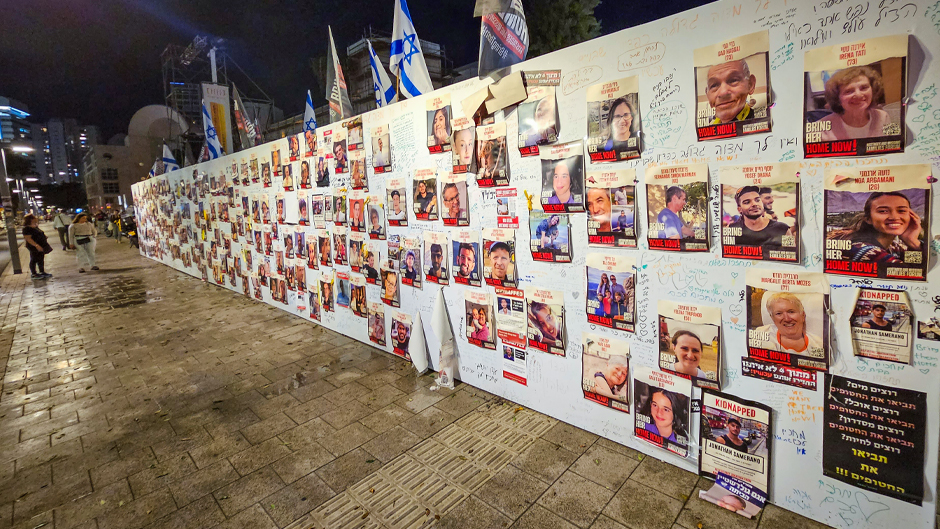At times, Enrique Ginzburg looks more like a soldier than the surgeon he actually is.
That’s because whenever the University of Miami trauma doctor ventures into conflict areas as part of his role with a nonprofit to aid front-line physicians and medical personnel working in embattled countries, he dons a flak jacket and helmet instead of surgical scrubs.
But whenever he wears such military accoutrements, the doctor in Ginzburg is still ever-present—such as the time only a month ago when he visited Israeli medics deployed near the front lines of the Israel-Hamas war, questioning them about what medical supplies they needed most.
“Their most critical requirement was for portable intubation kits and CO2 monitors that let them know that a patient has been properly intubated,” said Ginzburg, a professor of surgery at the Miller School of Medicine who serves as the trauma medical director and chief of surgery at Jackson South Medical Center’s Ryder trauma unit.
His brief stopover at the front lines was part of a one-week mission to Israel to tour and assess the needs of a group of hospitals and trauma centers throughout the country, many of which, since the start of the conflict, have been treating a multitude of patients—both soldiers and civilians—severely injured as a result of the ongoing war.
“These are health care facilities where 40 percent of the health care personnel are Arab Israelis rendering care not only to Israelis but also to Arab Israelis, Druze, and Palestinians. It’s a diverse patient population,” said Ginzburg. He visited the country in his roles as both a Miller School surgeon and as a volunteer physician with Global Surgical and Medical Support Group, a Washington, D.C.-based nonprofit of trauma surgeons and other health care providers who train doctors, nurses, and other medical personnel working in high-threat conflict areas around the world.
He was part of a delegation of physicians that included Drs. Joseph Rosenblatt, a professor of medicine, microbiology, and immunology and the William J. Harrington Chair in Hematology at the Miller School of Medicine; Roy Weiss, professor and chair of the Department of Medicine and the Kathleen and Stanley Glaser Distinguished Chair in Medicine; and Pascal Goldschmidt, former dean of the Miller School who is now chief medical officer of Lennar, a Miami-based homebuilder that, shortly after Hamas’s surprise attack on Israel on Oct. 7, made a significant gift to Israeli health care facilities.
The first stop on their mission to the Middle East: Ziv Medical Center in Safed, Israel. The health care facility, which recently became a Level 1 trauma center, provides cutting-edge care to a diverse population of patients, with Palestinians among the many people who are treated at the center each year.
There, Ginzburg and the others held two days of discussions with Ziv Medical Center director Salman Zarka, learning about the center’s most pressing needs. Ramping up efforts to prepare for emergency and ongoing medical care under wartime conditions, the hardening of key facilities, and challenges related to the provision of care were among the topics addressed, according to Rosenblatt. “We met the dedicated staff, which is uniquely diverse and includes Jews, Arabs, and Druze,” Rosenblatt said. “The hospital’s leadership identified key areas for the University of Miami’s assistance, including assistance with the rotations of physicians and the development of their trauma center.”
Ginzburg learned of Ziv’s need for operative medical equipment, and he quickly arranged for donations of that equipment to be delivered to the facility. A shipment of laparotomy trays, which are used to evaluate and treat different abdominal injuries; thoracotomy trays, used in thoracic and cardiac surgical procedures; and Thompson retractors, surgical instrument kits that expose and maintain access to the surgical site; will arrive at Ziv in the coming days, according to Ginzburg.
A consignment of the same surgical devices is also on the way to Jerusalem’s Shaare Zedek Medical Center, where patients with the most severe war injuries are often airlifted either directly from the front lines or from other area hospitals, Ginzburg said. Shaare Zedek treats Palestinians throughout the year, including some from Gaza, according to the center’s director of trauma, Alon Schwartz.
It was at Shaare Zedek that Ginzburg met bedside with patients who suffered some of the most severe injuries of the war—from an Arab Israeli civilian critically wounded by a terrorist to an Israeli serviceman with traumatic injuries to his chest, abdomen, arms, and legs.

But it was a case Ginzburg described as “a miracle” that astonished him. A patient with shrapnel in the base of his brain and gunshot wounds to his liver and other internal organs went into cardiac arrest three times, but Schwartz and the Shaare Zedek team were able to “bring him back each time and save him,” Ginzburg pointed out.
“He was awake and alert when I saw him, and he’s almost ready to go home,” Ginzburg added. “Just an incredible case.”
Ginzburg also observed surgical procedures at Shaare Zedek, giving advice to trauma surgeons as they performed an operation on a patient. “I was there to support the surgeons and provide input,” Ginzburg noted. “I was as hands-on as can be without being formally licensed in Israel.”
A team of Miller School of Medicine trauma physicians could be starting volunteer rotations at Israeli hospitals in the future, as officials at Ziv hospital, a newly designed Level 1 trauma center, have expressed to Ginzburg the potential need for more critical care and burn specialists at their facility in the event of a prolonged war or an expansion in the conflict.
“We have a list of trauma volunteers from across the country, and they’ll call us if they’re needed,” Ginzburg said. Those Miller School volunteers include Drs. Joyce Kaufman, Howard Lieberman, Mauricio Lynn, Antonio C. Marttos Jr., Brandon Parker, Matthew Sussman, Albert Varon, and Barth Green, who is also executive dean for global health and community service.
Additionally, Marttos, a professor of surgery in the Miller School’s Division of Trauma Burns and Surgical Critical Care, is in discussions to potentially establish telemedicine services for Magen David Adom, Israel’s national emergency medical, disaster, ambulance, and blood bank service, which, in addition to serving Israelis from all walks of life, also serves many Palestinians each year.
During the past several years, physicians Nicholas Namias, Louis Pizano, Mauricio Lynn, and Ginzburg have been instrumental in helping to lead a trauma training program for Lebanese, Saudi Arabian, and Israeli surgeons who come to Jackson Memorial Hospital’s Ryder Trauma Center for two years of intensive training. Most of those surgeons, Ginzburg noted, are trauma medical directors at Israel trauma centers. “They come with their families,” he said. “They all enjoy it, but it’s a big sacrifice to pack up and move to Miami to live for two years.”
Two of the program’s current fellows, Alon Bar and Sami Gendler, recently returned to Israel to assist in the delivery of health care in their home country but are now back in Miami to complete their training.
Along with his wife, Barbara, a retired occupational therapist who accompanied Ginzburg on the trip, he also visited two major trauma centers in Tel Aviv: Ichilov Hospital and Sheba Medical Center. The trauma medical directors at those two facilities—Dror Soffer and Yoram Klein—were the first graduates of the trauma training program at Ryder.
Ginzburg’s Israeli trip comes more than a year after he deployed to Ukraine to volunteer at a hospital in Lviv, consulting with Ukrainian physicians on the care of civilians injured in that country’s ongoing war with Russia and establishing a rotation of volunteer trauma and burn surgeons with the Washington, D.C. nonprofit.

